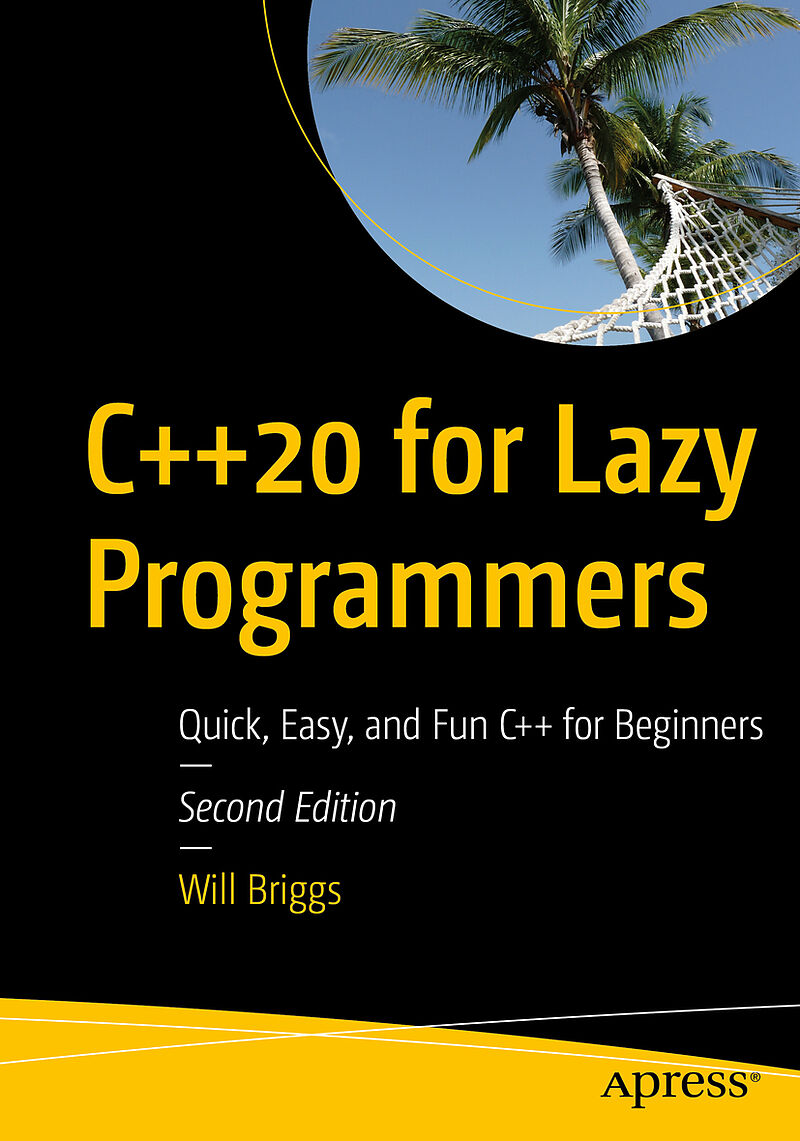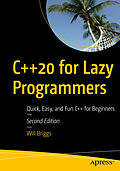

C++20 for Lazy Programmers
Beschreibung
Ready to learn programming with less effort and more fun? Then do it the lazy way! C++20 for Lazy Programmers uses humor and fun to make you actually willing to read and eager to do the projects as you master the popular and powerful C++ language. Along the w...Format auswählen
- E-Book (pdf)CHF 71.00
- Kartonierter EinbandCHF 71.20
Wird oft zusammen gekauft
Andere Kunden kauften auch
Beschreibung
Ready to learn programming with less effort and more fun? Then do it the lazy way! C++20 for Lazy Programmers uses humor and fun to make you actually willing to read and eager to do the projects as you master the popular and powerful C++ language. Along the way it includes many features from the new C++20 standard, such as ranges, spans, format strings, the spaceship operator, and concepts (template parameter requirements), and provides brief introductions to modules and coroutines. With this unique method, you'll stretch your abilities with a variety of projects, including your own C++ arcade game. You'll construct your own classes, templates, and abstract data types. After reading and using this book you'll be ready to build real-world C++ applications and game projects on your own. What You Will Learn:
- The brand-new C++20 standard
- Programming graphics and games with the SDL library, using SSDL, the "Simple SDL" wrapper library
- How to use the most common C++ compilers -- Visual Studio for Windows, and g++ (with Unix or MinGW) -- and their associated debuggers
- Anti-bugging for easy fixes to common problems
- Sound practices for becoming a productive programmer
- How to make your own big projects, including a C++-based arcade game
- The built-in Standard Template Library (STL) functions and classes for easy and efficient programming
Powerful data types including strings, stacks, vectors, and linked lists -- not by reading about them but by building them -- preparing you further for a career in programming Who This Book Is For
All who are new to C++, either self-learners or students in college-level courses.Covers many examples, including an arcade game application project Includes help with both the Visual Studio and g++ compilers plus their debuggers Source code available at https://github.com/Apress/cpp20-for-lazy-programmers
Autorentext
Will Briggs, PhD is a professor of computer science at the University of Lynchburg in Virginia. He has 20+ years of experience teaching C++, 12 of them using earlier drafts of this book, and about as many years teaching other languages including C, LISP, Pascal, PHP, PROLOG, and Python. His primary focus is teaching of late while also active in research in artificial intelligence.Leseprobe
Im PDF Reader anzeigen...Inhalt
1 Getting started.- 2 Images and sound.- 3 Math: types, operations, consts, and math functions.- 4 Mouse, and if.- 5 Loops and text input.- 6 Algorithms and the development process.- 7 Functions.- 8 Functions (Continued).- 9 Using the debugger.- 10 Arrays and enum class.- 11 Animation with structs and sprites.- 12 Building your own arcade game: input, collisions, and putting it all together.- 13 Standard I/O and file operations.- 14 Character arrays and dynamic memory (pointers).- 15 Classes: the basics.- 16 Classes, continued.- 17 Operators, and destructors.- 18 Exceptions, recursion, and O notation.- 19 Classes, continued: inheritance.- 20 Template functions and classes.- 21 Multiple inheritance and virtual functions.- 22 Linked lists.- 23 The Standard Template Library (STL).- 24 Building bigger projects.- 25 History.- 26 Esoterica (recommended).- 27 Esoterica (not so recommended).- 28 C.- 29 Moving on with SDL.- Appendices.- A. Help With Setup.- B. Operators.-C. ASCII codes.- D. Fundamental Types.- E. Escape Sequences.- F. Basic C Standard Library.- G. Common Debugger Commands.- H. SSDL Reference
